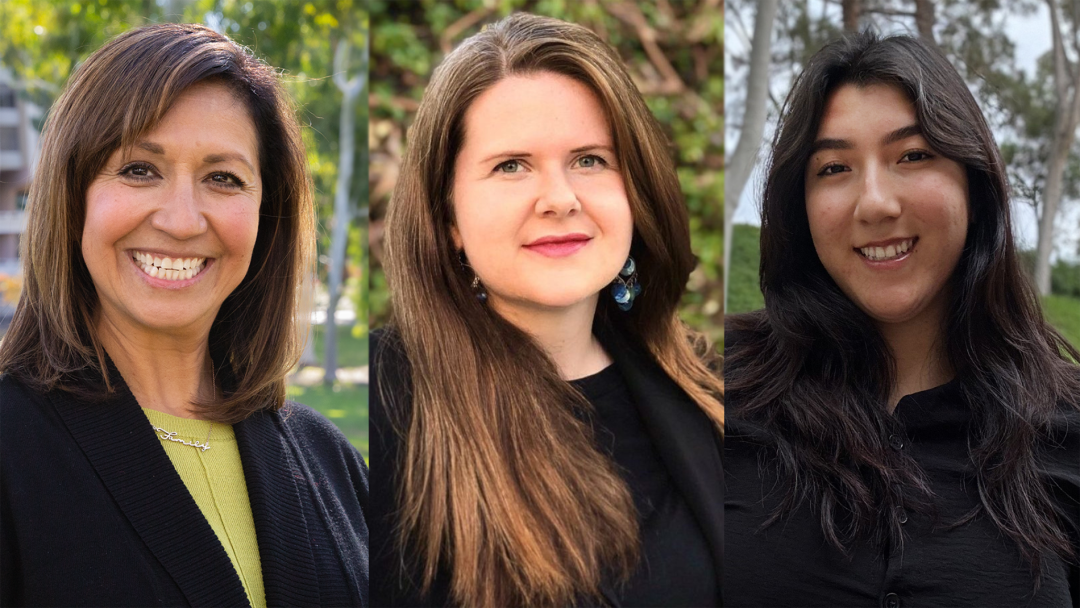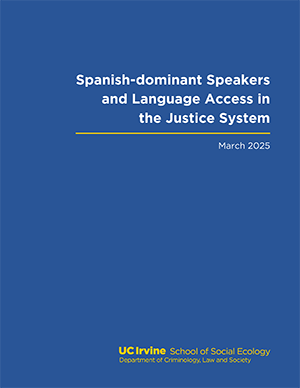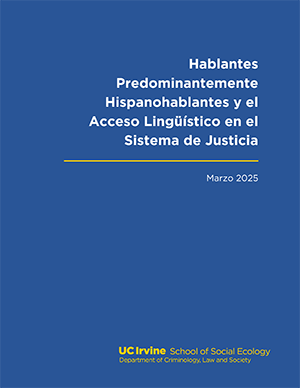
Nancy Rodriguez, left, Meghan M. Ballard, center, and Melissa Martinez are the co-authors of a report on language barriers in the justice system.
Spanish speakers in U.S. justice system face barriers
More and better interpreters, more bilingual personnel and opportunities to improve English language proficiency would enhance communication for people who mostly or completely speak Spanish and are entangled in the U.S. criminal justice system, concludes a new MacArthur Foundation-funded policy brief by UC Irvine researchers.
 “Spanish-dominant Speakers and Language Access in the Justice System” was created with support from the John D. and Catherine T. MacArthur Foundation as part of the Safety and Justice Challenge, which aims to reduce over-incarceration by changing the way America thinks about and uses jails.
“Spanish-dominant Speakers and Language Access in the Justice System” was created with support from the John D. and Catherine T. MacArthur Foundation as part of the Safety and Justice Challenge, which aims to reduce over-incarceration by changing the way America thinks about and uses jails.
The report, which also is available in Spanish, is being presented by UC Irvine Department of Criminology, Law & Society Professor Nancy Rodriguez, doctoral candidate Meghan M. Ballard and alumna Melissa Martinez (2024, BA criminology, law & society), who was an undergraduate lab assistant for Rodriguez.
An estimated 69.2 million people in the U.S. speak a language other than English at home, with 26.5 million people classified as limited English proficient (LEP).
“LEP individuals have a limited ability to read, write, speak or understand English and are more likely to need language assistance — such as interpretation or translation — when communicating with, for example, officials who work within the criminal justice system (CJS),” Ballard explains. “Without proper language assistance during these interactions, LEP individuals risk wrongful detention and arrest, inadequate representation, and other adverse outcomes that can further exacerbate inequities in the CJS.”
 The policy brief examines the experiences of Spanish-dominant individuals within the CJS and addresses the lack of research on LEP individuals’ encounters with crime and the CJS.
The policy brief examines the experiences of Spanish-dominant individuals within the CJS and addresses the lack of research on LEP individuals’ encounters with crime and the CJS.
“Our goal was to highlight a population highly overlooked in CJS research and move toward addressing gaps in language access policies and practices,” according to Professor Rodriguez.
The research uncovered what Ballard described as “a surprising—and, sadly, not entirely unexpected—finding”: the widespread reliance on family members and friends, especially children, to serve as informal interpreters during interactions with the CJS “despite concerns about accuracy and confidentiality.”
“Another noteworthy insight was that, while many interviewees expressed mixed feelings about their role as language brokers due to their limited English proficiency, they nonetheless felt a strong sense of responsibility and pride in helping others navigate the system,” the doctoral candidate added. “This likely influenced one of our three key recommendations regarding the self-improvement of English proficiency. This recommendation speaks to not only a desire to improve the system, but also to empower individuals to improve their own English language skills so that they can more effectively engage with the CJS.”
The UC Irvine team analyzed original data on the experiences of 85 system-impacted Spanish-dominant speaking individuals who live or have resided in the U.S. Southwest. Their shared experiences and perceptions were based on access to language services across the CJS spectrum: police stops, arrests, interviews, court hearings and incarceration. The hope is the policy brief findings can lead to a more equitable justice system.
“The implementation of several recommendations, including expanding qualified interpreters, increasing the number of bilingual personnel within the CJS, and supporting self-improvement of English proficiency will go a long way toward enhancing the accessibility, fairness, and effectiveness of the justice system for LEP individuals,” Rodriguez says.
Adds Ballard: “When all individuals, regardless of their English language proficiency, are provided the tools to fully participate in their interactions with CJS officials, it not only leads to more equitable legal outcomes but also fosters greater public trust, social stability, and overall societal well-being.”
— Matt Coker